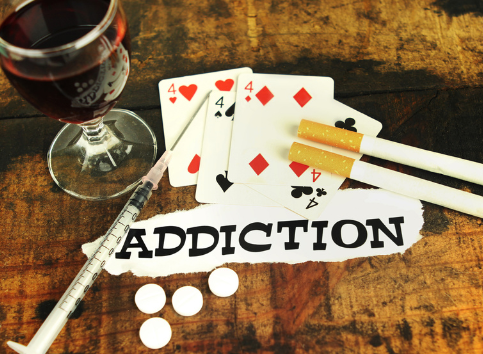Addictions, what are they and how to treat them?
Published Aug 30, 2022 • By Claudia Lima
Addictions pose a major public health problem. They affect millions of people and can lead to problems performing daily tasks and can cause long-term complications.
What is an addiction? What are the causes ? How to treat them?
Want answers? Read our article!

In the US, over 21 million Americans have at least one addiction. The most widely-abused substance is alcohol. About 2.1 million Americans have an Opioid use disorder. There are about 100,000 new Heroin users each year. 30-40 million Americans smoke Marijuana every year. About 34 million Americans smoke cigarettes and 5 million Americans are regular Cocaine users. 964,000 Americans are addicted to Meth. From these statistics, you can see how prevalent substance abuse and addiction is throughout the country. This is not to mention the activity addiction such as gambling and gaming. It is predicted that there are between 3 million and 6.5 million disordered gamers in the United States and 1% of the population has a gamlbing problem.
What are addictions?
Addictions are brain pathologies defined by an addiction to a substance or an activity. They are characterized by the repeated inability to control a behavior and the continuation of that behavior despite the knowledge of its negative consequences. They include addictions to psychoactive substances such as alcohol, tobacco, certain medications and illicit drugs, but also behavioral addictions, without psychoactive substances, such as gambling and video games.
To learn more about addictions, read our article:
>> What is addiction? <<
What are the factors that lead to addiction?
There are many risk factors for the transition from consumption to addiction. They depend on the individual, the substance and the environment.
The individual
Both genetic and psychological factors can contribute to the transition to addiction. These factor include: the age (mostly young people), the sex (mostly men), the brain maturity, the personality and the mood of an individual.
Certain psychological disorders are conducive to addiction and are often associated with multiple use of addictive products. These disorders are depression, bipolar disorder, anxiety, obsessive-compulsive disorder (OCD), borderline personality disorder, eating disorders (ED) and attention deficit disorder with or without hyperactivity (ADHD).
Psychological fragility, such as low self-esteem, may also be involved. Significant events or traumas can also be at the origin of addictions.
The substance
There are substances that have a strong addictive power which will affect how quickly the addiction can take hold. The most addictive substance is tobacco, followed by heroin, cocaine and then alcohol.
The environment
The addictive practice is influenced by the environment in which the individual is raised. The social and family context and/or the ease of availability of the product facilitates addictive behavior.
What are the consequences of addictions?
The immediate effects of a substance or activity are euphoria, loss of control, stress reduction and inhibition. In the event of overconsumption of a substance, quantities above the body's tolerance limit, it may be life-threatening. For example, an opiate overdose can lead to death or alcohol intoxication can become a coma.
Prolonged exposure to the substance or activity can lead to other symptoms. The substance use or practice gradually invades the addicted person's daily life. There is a risk of isolation, stigmatization, loss of employment and/or school dropout.
In the long term, there can be medical, psychological and psychiatric repercussions.
There can also be social and health-related consequences. In 2020, there were over 90,000 drug-involved overdose deaths in the US. There were over 68,000 opioid related deaths. More than 16 million Americans are living with a disease caused by smoking.
How are addictions treated?
The treatment of a person with an addiction has a multidisciplinary approach. It is a long-term treatment whose objectives are to stop the use of the substance or the activity for good.
The first step is to consult a psychiatrist, they are the only doctor qualified to diagnose the addiction. He or she will also decide on the appropriate therapeutic strategy: psychotherapy, medication, intervention with family/friends, hospitalization, or other approaches such as sophrology. It is sometimes necessary to combine drug treatment with individual and/or group psychological care and social support.
Treatment methods differ according to the type of addiction involved. Moreover, the treatment must take into account all the factors that promote addiction, to reduce both the risks and the damage associated with them.
Complete elimination of the substance or activity is essential. However, sometimes a gradual reduction in use, as with alcohol and tobacco, is more effective than stopping cold turkey.
Psychological care
In order to ensure a proper care of the patient, evaluation and motivation interviews are carried out in order to estimate the consumption, dependence, and motivation to stop in order to establish a cessation protocol tailored to each patient. It is recommended that these interviews be carried out with an addictology professional.
Psychotherapy is often necessary, and it takes place after the motivational interview. Many approaches exist: psychodynamic therapies, interpersonal therapies (IPT), cognitive and behavioral therapies (CBT), etc. Psychosocial support helps to preserve or promote social integration and to accompany the patient.
Discussion groups offer significant support to people with an addiction. There are Alcoholics Anonymous, Narcotics Anonymous, Gamblers Help, etc.
Treatment for gambling addictions is primarily individual or group psychotherapy, and sometimes the family is involved.
Drug treatment
Behavioral therapies can be paired with medications, depending on the type of addiction. The duration of the treatment varies from person to person.
Smoking cessation
Quitting smoking is most effective when nicotine replacement therapy is combined with psychological support. The nicotine replacement therapy reaches the brain without passing through the lungs and relieves the sensation of withdrawal. The different nicotine substitutes are patches (or nicotine patches) to be applied to the skin, gum to be chewed, nicotine to be inhaled through an inhaler or in mouth sprays, or tablets to be sucked or melted under the tongue.
Alcohol withdrawal
Medications such as acamprosate, naltrexone, nalmefene and baclofen are often used.
Opiate withdrawal
Withdrawal symptoms from opiates can be severe which is why other opioids, such as methadone and buprenorphine, are prescribed first, sometimes in combination with naloxone. These interact with opioid receptors in the brain thus providing relief from harsh withdrawal symptoms. Their use is strictly supervised.
The withdrawal syndrome is symptomatic manifestations occurring in the immediate or delayed aftermath of the cessation of drug use and is expressed by a state of psychological, behavioral and physical withdrawal. Once withdrawal is complete, naltrexone helps prevent relapse.
Withdrawal from cannabis
Cannabis addiction is essentially psychological, so psychotherapy is the preferred approach. However, to help reduce the signs of withdrawal, mirtazapine or dronabinol may be prescribed.
Withdrawal from cocaine
There is no specific substitution treatment for cocaine, however, psychotherapy and a short-term withdrawal, and acetylcysteine, has been shown to be effective. Relapse prevention can be achieved by prescribing topiramate and disulfiram (also used for alcohol dependence).
Withdrawal from video games
The treatment of video game addiction requires psychological support. Therapeutic support can combine several methods: for example, family therapy, combined with hypnosis and self-help groups.
Social support may be offered insofar as the pathological gambler may have lost all financial autonomy and is experiencing great difficulties in reintegrating. If the addiction is extreme and the gambler is diagnosed as depressed, treatment can also be provided by medication.
The heterogeneity of the profiles of pathological gamblers makes it difficult to establish a therapeutic strategy. Nevertheless, alternative methods have proven worthy, such as mindfulness meditation and repeated transcranial magnetic stimulation (rTMS), which eliminates cravings. Craving is an irrepressible desire to consume a substance or to perform a rewarding behavior when one does not want to at that moment.
There are different ways to take stock of one's substance use or addictive practice. The attending physician also has an important role in counseling, managing and guiding patients. The same is true for an occupational physician.
Below are some useful contacts:
For immediate emergencies, call 911
Poison Control emergency number: 1-800-222-1222
DrugAbsue.com: (928) 900-2021
Substance Abuse and Mental Health Services Administration (SAMHSA): 1-800-662-4357
National Suicide Prevention: 1-800-273-8255
Drugfree.org: call 855-378-4373
National Problem Gambling Helpline: 1-800-522-4700
Sources :
Addictions, solidarites-sante.gouv.fr
Drogues et addictions - chiffres-clés, ofdt.fr
Définition et facteurs favorisant de l'addiction, ameli.fr
Addictions, inserm.fr
Addictions et dépendances, e-psychiatrie.fr
Addictions - Traitements, pourquoidocteur.fr
Prise en charge des troubles addictifs, ameli.fr
Tout savoir sur l'addiction, frm.org
Rapport européen sur les drogues, emcdda.europa.eu
Traitements médicamenteux, addictaide.fr

 Facebook
Facebook Twitter
Twitter

